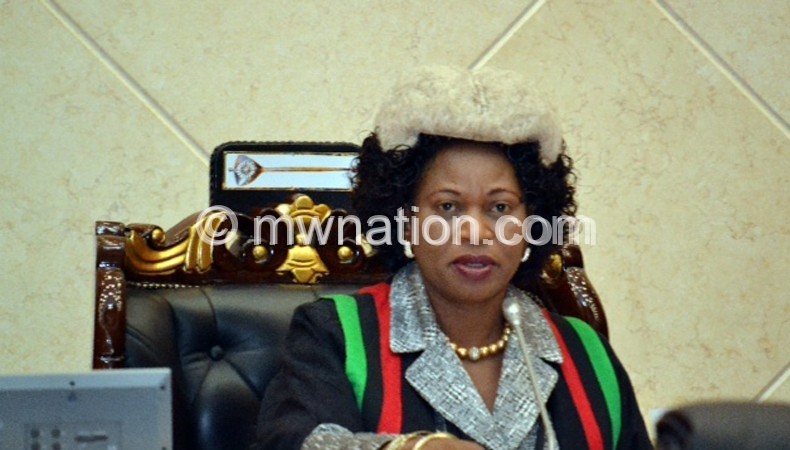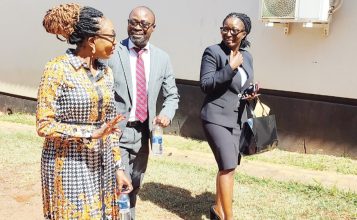DPP undecided on speakers’ scam
Director of Public Prosecutions (DPP) Mary Kachale is undecided on the issue involving Deputy Speakers who were pocketing house allowances beyond their entitlements.
The DPP, who was asked for her opinion a year ago by the Malawi Law Society (MLS), has said she has not made up her mind on the matter because the matter is unprecedented.

Said Kachale: “There are some matters that are not possible to process expeditiously due to the novelty of the issues raised and the human resource challenges we have. This referral from MLS is one such. We hope to conclude the consideration of this issue as soon as practically possible.”
But MLS president Khumbo Soko said his office is still weighing options on what course of action to take.
Stated Soko: “We are still waiting for the response. We always have options but you can imagine I don’t think it would be prudent for us to be broadcasting those options in the media.”
The Anti-Corruption Bureau (ACB) and Parliament differ on a number of issues which include whether the Deputy Speakers’ conduct is tantamount to corruption; whether Parliament secretariat is culpable in the overpayments; why the National Assembly continues to pay rentals for Speaker Richard Msowoya yet it discontinued the Deputy Speakers’ rental payments and whether the President approved new housing allowances for the speakers, according to an ACB report and interviews with PSC and Parliament secretariat.

When Weekend Nation exposed the issue in 2016, the Parliamentary Service Committee (PSC) asked the ACB to investigate if corruption was involved.
An ACB confidential report, which we have seen (Ref No CR /LL/152/2015) recommends, among other things, that administrative action should be taken against the Deputy Speakers and deputy clerk of Parliament (corporate services) Renard Mapemba—whom ACB accuses of negligence of duties.
ACB’s investigations found that the house which Esther Mcheka-Chilenje is residing in, on plot number 47/1/42 located in Area 47 in Lilongwe, is owned by herself, and also that property title number Alimaunde 49/1/921 belongs to Clement Chiwaya.
On whether corruption was involved, ACB says in the report that it sees no evidence of the vice by Mcheka-Chilenje and Chiwaya residing in their houses and receiving rents instead of housing allowance.
The bureau argues that terms and conditions for Deputy Speakers allow them to stay in their own houses or in rented properties. Either way, says the bureau, they would be entitled to the same allowance.
Reads the report in part: “The National Assembly should calculate and surcharge the Speaker and the Deputy Speakers for all the housing allowances overpaid to them based on the [2009] Terms and Conditions of Service for the Speaker and Deputy Speakers in force at the material time.”
But the suggestions by ACB to drag the Speaker of Parliament into the scam have not gone down well with some PSC members who believe the bureau erred in some of its recommendations.
A member of the commission, who sought anonymity, queried the bureau for dragging Msowoya into the matter.
“This is an issue of social justice and the reason this issue has stagnated is because the ACB faulted the Speaker without any justification. If there are people that need to be disciplined, then perhaps it is those at the secretariat for ill-advising the commission and not dragging innocent people into this issue,” said the member.
A PSC’s response to the ACB investigations report, dated June 6 2016, also blames the bureau for making its findings without interviewing or recording statements from members of the PSC, except the Speaker.
The PSC states that as a corporate body it has powers to procure services for Parliament and that accommodation for the political leadership is an administrative issue which it has powers to handle under Section 1(1) (f) of the Parliamentary Act.
PSC adds that it did not make any changes to the housing allowance payable to the political leadership as this could not be implemented without the approval of the President.
The response reads: “The Deputy Speakers are elected officials who occupy offices created under the Constitution. Apart from removal from office… there is no provision for any administrative action in the Constitution, Standing Orders or Conditions of Service. We are therefore unaware of any administrative action (and the basis of such action) which can be imposed on the Deputy Speakers.”
In response to our questionnaire, assistant Clerk of Parliament, protocol and public relations Leonard Mengezi also queried why the Speaker was being faulted.
Said Mengezi: “The Speaker is residing in rented accommodation and has at no time received housing allowances. The Parliament secretariat remits rental money directly to the landlord.”
He added that the secretariat was acting on the directions of the Deputy Speakers and genuinely believed that the money was being remitted directly to the landlord.
Private practice lawyer Justin Dzonzi observed that the matter is neither an issue of corruption nor that of theft.
Said Dzonzi: “This is, strictly speaking, an employment matter. It’s a contractual issue between an employer and an employee. The two Deputy Speakers do not have the power or mandate to pay themselves. So, if there was a mistake in either making a decision to give them house allowances which were different from approved ones, or whatever, then that fault cannot be placed on the Deputy Speakers.
“It [the mistake] ought to be placed on the decision makers. So, it might be the Parliamentary Service Commission or the Parliament Secretariat.”
Parliament had to adjust the house rental limits for the three speakers after the secretariat could not get suitable accommodation within the old limit of K450 000 per month for the Speaker, K150 000 per month for Deputy Speakers and K100 000 per month for the Leader of Opposition.
At an extraordinary meeting held on July 13 2014, the PSC resolved that rates for housing be adjusted to K750 000 per month for the Speaker and K550 000 per month for the Deputy Speakers, to be paid directly to landlords for the procured service (house rental), and not to the individuals as an allowance.
This is why says Parliament leader of Opposition Lazarus Chakwera—who opted to live in his own house—has consistently been getting K100 000 per month house allowance as there was no need to find accommodation for him, which may also have been possible at a rate beyond his allowance entitlement.





